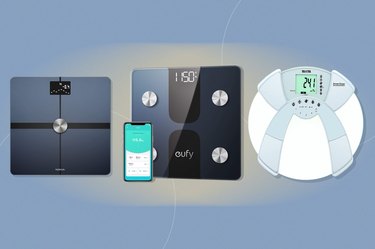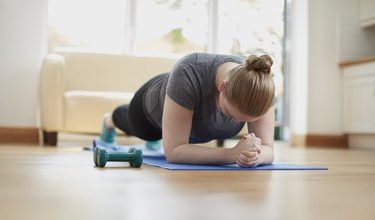The 7 Best Body Fat Scales to Try in 2024

LIVESTRONG.com Creative
Virtually everyone has a standard scale at home. But the number of pounds flashing on an old-school bathroom scale can’t tell us how much of our body is fat as opposed to lean mass. That’s where body fat scales come in.
“Body fat scales are tools to measure aspects of your body composition,” says Marvin Singh, MD, precision medicine expert from the Precisione Clinic in greater San Diego. “They commonly use a method called bioelectrical impedance analysis, which basically sends a weak current through your body to determine your body composition.”
Video of the Day
Video of the Day
Body fat scales have exploded in popularity, which means shoppers now have tons of options to choose from. But because they can all look very much alike, selecting the best scale can be confusing. So we’ve whittled it down to the following can’t-miss picks.
The Best Body Fat Scales
- Best Overall: Renpho Bluetooth Body Fat Scale ($24.99, Walmart)
- Best on a Budget: Etekcity Body Fat Monitor Scale ($19.49, Amazon)
- Best Splurge: QardioBase2 ($149.99, Amazon)
- Best High-Tech: Withings Body+ ($99.95, Amazon)
- Best Low-Tech: INEVIFIT Body-Analyzer Scale ($49.99, Amazon)
- Best for Athletes: Wyze Smart Scale ($39.98, Walmart)
- Best for Families: Eufy Smart Scale C1 ($29.99, Amazon)
How We Chose
We asked Dr. Singh and certified personal trainer Anel Pla to help us evaluate the options. We selected the best body fat scales below based on their insight and the following criteria:
- Accuracy
- Personalization
- Quality materials
- Ease of use
Learn more about how we select and cover products here.
1. Renpho Bluetooth Body Fat Scale
Pros
- Budget-friendly
- Allows multiple users
- FDA-certified
- Syncs with fitness apps
Cons
- May have limited longevity
An all-around winner, Renpho’s model measures 13 different metrics, is FDA-certified and allows many popular fitness apps to be synced to the monitor.
You’re also able to set up multiple profiles on this comprehensive body composition analyzer, which is perfect for couples who share it.
One of the many happy reviewers noted it is really sturdy, even standing up to rough handling by a toddler. Another called it “the one thing I didn’t know I needed.”
Weight limit: 396 lbs.
2. Etekcity Body Fat Monitor Scale
Pros
- Budget-friendly
- User-friendly
Cons
- Some users dislike the app
If cost and ease of use are your top considerations, look to this brilliant, basic option by Etekcity. It measures BMI, muscle mass and body water while being straightforward to use.
It only connects to your mobile device via Bluetooth, but if that’s not a deal-breaker, it’s hard to go wrong here. Plus, it’s available in two sizes and colors.
Weight limit: 400 lbs.
3. QardioBase X
Pros
- Syncs over WiFi or Bluetooth
- Allows multiple users
Cons
- Set up can be time-consuming
The features of this top-tier model measure up to its sleek, upscale look. It tracks BMI, your full body composition and, oh yes, your weight. It then sends all that data to your phone, syncing via either Bluetooth or Wi-Fi.
It has two special modes, one for pregnancy and another for those who have implanted medical devices. It also accommodates multiple users with auto recognition.
And if you are squeamish about facing actual numbers (hey, we all are sometimes), you can set it to display emojis that convey the situation at hand.
Weight limit: 396 lbs.
4. Withings Body+
Pros
- Allows multiple users
- Syncs over Wi-Fi
Cons
- Some people have difficulties with the app
A great balance of price and performance, the Body+ tells you all you need to know to make meaningful decisions to improve the state of your body over time. It melds activity data (Bluetooth not required) from third-party apps and expert advice with your stats, so you have a complete picture of where you are, where you need to go and ideas about how to get there.
It has a large surface that’s extra resistant to slipping — a bonus if you have bigger feet.
Weight limit: 396 lbs.
5. INEVIFIT Body-Analyzer Scale
Pros
- User-friendly
- No apps required
Cons
- Small buttons
- Can be a bit unstable as you step on
This well-reviewed pick may not have every last bell and whistle, but it’s definitely worthy of consideration if you like your tools straightforward.
It tracks 11 measurements, including visceral fat. Made of tempered glass with transparent foot electrodes, it has a familiar bathroom scale feel.
Weight limit: 400 lbs.
6. Wyze Smart Scale
Pros
- Budget-friendly
- Measures 12 essential metrics
- Comes with an app
- Unlimited users
Cons
- Measurements are not always accurate, according to some reviewers
If you’re looking for a lightweight scale that can measure 12 essential metrics like water weight and lean body mass, then this scale by Wyze could be a good pick. It’s versatility and tracking abilities make it one of the best body fat scales for athletes.
Plus, it pairs with most fitness apps like Apple Health and Google Fit, making it great for athletes tracking their training goals.
Weight limit: 300 lbs.
7. Eufy Smart Scale C1
If you have multiple members of your household looking to track their body composition, this scale by Eufy is one of your best bets. It can hold information for up to 16 users, and syncs to a mobile app so you can keep track of stats like muscle mass, body fat percentage and BMI right from your phone.
The numbers on the scale itself are easy to read and getting the scale set up is seamless, too — making it perfect for the whole family to use.
Weight limit: 400 lbs.
What to Look for in a Body Fat Scale
As you can see, body fat scales sport an array of features. Many of those boil down to personal preference, Dr. Singh says. “What kind of power source they use, how big it is, whether it has Wi-Fi or Bluetooth capability or not… consider what features really matter to you before making your choice.”
Generally speaking, though, Anel Pla certified personal trainer at Simplexity Fitness in New York City, points to these as key features:
1. Precision Sensors
The most important feature your digital body fat scale must possess is the ability to provide accurate results. This will rely heavily on the sensors.
2. Different Measurement and Date Options
Aside from body fat percentage, some body fat scales can also compute visceral fat (fat that hides in the spaces between the abdominal organs, which can create serious health issues), BMI, bone and muscle mass, water weight and metabolic age, among other measurements.
It’s also nice if it enables you to track different goals on a daily, weekly and monthly basis.
3. Usable on Carpet (if You Don’t Have Any Hard, Flat Floors)
Many scales don’t generally measure effectively when placed on carpet or uneven tile.
4. Simple Instructions
They should be easy to understand, with useful diagrams and advice on how to interpret your results.
5. Ample Profiles
There should be enough profiles (saved sets of individual information) for all household members who will regularly use the scale. A “guest” profile can be handy for visitors.
6. Tempered Glass
It stands up best to humidity, which is important if the scale will be left in a bathroom.
How Body Fat Scales Work
Body fat scales use bioelectric impedance analysis to determine your body fat, per Houston Methodist. An electrical current — which is both safe and unnoticeable — will make its way through your body. The scale measures the resistance of the electric current, which is meaningful since fat has a lower water content than muscle.
Are Body Fat Scales Accurate?
“Body fat scales provide rough estimates, since the results are influenced by external factors and variables that our bodies go through,” Pla says.
That is to say, a body fat scale isn’t necessarily accurate, per Cedars Sinai. In particular, they can be thrown off by your hydration levels, overestimating body fat when you’re dehydrated and underestimating it if you’re very hydrated, according to Houston Methodist. Don’t count on your body fat scale to provide as much accuracy as the more sophisticated options that can be found at weight-management clinics.
“Nevertheless, they still come in handy in tracking your fat loss progress,” Pla says.
Tips for Using a Body Fat Scale
Here, Pla offers a checklist to ensure results are as precise and useful as possible.
- Make sure your feet are bare and clean to ensure good contact with the scale’s sensor pads.
- Measure yourself at the same time of day on the same surface (a hard, level floor, unless your scale is specifically made for accuracy on carpeting.)
- Don’t eat or drink for 4 hours beforehand.
- Try to urinate within 30 minutes before taking a reading.
- Don’t use your scale immediately after waking up, or for 24 hours after excessive exercise or alcohol intake. Your body’s water content could be uneven or atypical, which will make the reading unreliable.




